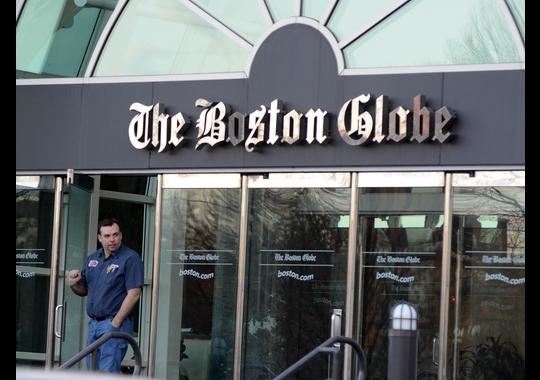Rieder: Boston Globe sale a sign of the Times
Talk about your ultimate conflict of interest.
John Henry, principal owner of the Boston Red Sox, is buying The Boston Globe from the New York Times Co.
There are few bigger stories in sports-crazed Boston than the Sox, and news outlets generally do a terrible job when they have to cover themselves. Now New England's top newspaper and the team its readers love so passionately will be owned by the same person. Let's hope Henry is disciplined enough to let his new acquisition cover his older one the right way.
One thing is sure: Readers and media observers will be paying close attention.
STORY: Red Sox owner enters $70M deal for Boston Globe[1]
Brain McGrory, the paper's editor, assures us there's nothing to worry about. "We have no plans whatsoever to change our Red Sox coverage specifically, or our sports coverage in general, nor will we be asked," McGrory was quoted as saying in the Globe's story on the sale. "The Globe's sports reporting and commentary is the gold standard in the industry."
The issue isn't in entirely new, since the Times Co. used to have a minority interest in the team. But that's a far cry from being the principal owner.

Rem Rieder is a media columnist for USA TODAY.(Photo: USA TODAY)
The transaction, announced early Saturday morning, is a vivid reminder of the staggering decline of the newspaper business in the digital era. Twenty years ago, the Times Co. bought theGlobe for $1.1 billion. The price tag just two decades later: a bargain-basement $70 million.
The deal also includes another Massachusetts newspaper, the Worcester Telegram & Gazette, and the Globe's digital operations, as well as a 49% interest in Metro Daily, a free paper.
Selling the Globe fits in nicely with the Times Co.'s strategy for the future. In recent years it has been shedding its other holdings to concentrate on the core brand. Last year it sold the 16 regional newspapers it owned around the country. It also unloaded About.com, a question-and-answer website.
The Times is widely regarded as the world's premier news organization. After building itself into a national paper, it is now working to enhance its international presence. As part of that effort, it is changing the name of the International Herald Tribune, the Paris-based paper it owns, to the International New York Times.
Despite all the wonderfulness, the Times is not immune to the digital transformation that has rattled the media landscape. At one point it had to turn to a controversial Mexican billionaire for a loan to stay afloat. The Times has cut back its staff some, but not nearly as sharply as most newspapers have. It continues to embrace and base its future on excellent journalism.
In one of the most important developments in the media world in recent years, the Times in 2011 began charging for digital content. Rather than erect an impenetrable paywall, it adopted a metered approach in which readers would have access to some stories free before the meter started running.
Charging for digital material was long considered anathema. "Information wants to be free" was the refrain. But the strategy has worked, big time. The Times now has 699,000 digital subscribers, and the move helps shore up print circulation because those subscriptions include free digital access.
Many papers have followed the Times' lead, and the result is a new revenue stream for an industry that desperately needs one.
One final thought: The sale of the Globe means a return to local ownership. Before the Times picked it up, the Globe was long owned by the Taylor family, who were locals.
It is easy to romanticize local ownership. There's something reassuring about having important institutions in the hands of people who are part of the community. But the track record is mixed. There are plenty of examples of truly wretched local ownerships of newspapers, just as there are shining success stories. As with everything else, it all depends on who the owner is.
The Globe is a hugely important institution with a distinguished history. It did excellent work in recent years under the editorship of Marty Baron, leading the way in coverage of the Catholic Church priest scandal. (Baron left last year to become executive editor of the Washington Post.) The Globe performed well this year under McGrory in its coverage of the Boston Marathon massacre.
Henry made his money through investment funds. He's a neophyte when it comes to the media business, and he enters it at a seriously challenging time. Little is known about his approach to journalism or his plans for the Globe.
"This is a thriving, dynamic region that needs a strong, sustainable Boston Globe playing an integral role in the community's long-term future," Henry said in a statement. "In coming days there will be announcements concerning those joining me in this community commitment and effort."
Here's hoping that Henry is one of those white hat local owners.

A man walks out of The Boston Globe on Feb. 20 in Boston, Mass.(Photo: Darren McCollester, Getty Images)









